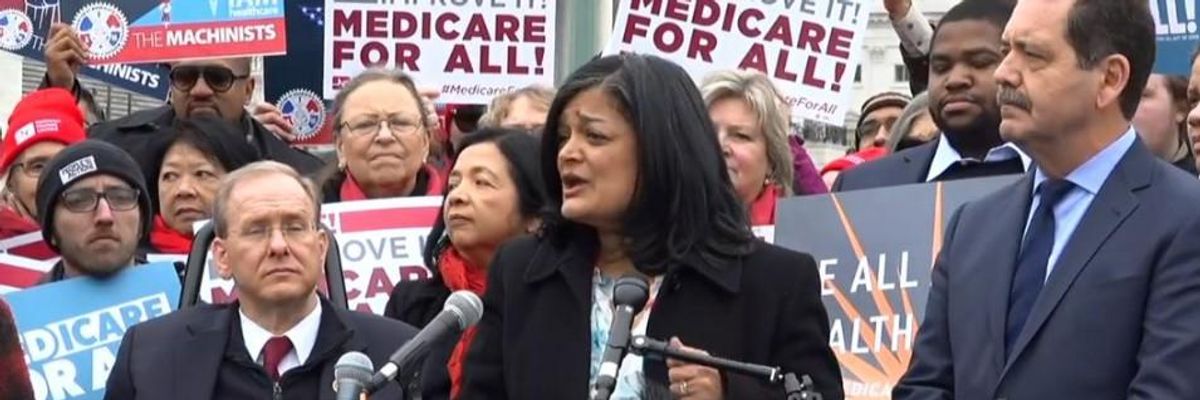At a Thursday event celebrating the one-year anniversary of House Democrats introducing landmark Medicare for All legislation in the U.S. House, the bill's sponsors and medical and policy experts made the case that establishing a national single-payer healthcare system is essential for racial equity.
Rep. Pramila Jayapal (D-Wash.), co-chair of the Congressional Progressive Caucus, is the lead sponsor of the Medicare for All Act of 2019 (H.R. 1384)--now backed by more than a hundred House Democrats.
"We have a burden of our healthcare system that does disproportionately affect black and brown folks... and poor communities," Jayapal said at the event Thursday. She highlighted the disparities in health insurance coverage for people of color and recent findings that black people are three times more likely than their white peers to die of pregnancy-related causes in the United States.
Sharing updates from the event on Twitter, the group Social Security Works repeatedly declared that "#MedicareForAll is a racial justice necessity," borrowing language from a July 2019 letter to Congress from 10 national groups "that represent people of color" in support of Jayapal's bill and S. 1129, similar legislation that Sen. Bernie Sanders (I-Vt.) introduced in April 2019.
Jayapal, who endorsed Sanders' second run for president last month and serves as his campaign's national health policy chair, was joined at Thursday's live-streamed event by Democratic Reps. Judy Chu (Calif.), Yvette Clark (N.Y.), Debbie Dingell (Mich.), Sheila Jackson Lee (Texas), and Rep. Ilhan Omar (Minn.).
Other speakers included Dr. Sanjeev Sriram, founder of the All Means All Campaign at Social Security Works; Liz Watson, executive director of the Congressional Progressive Caucus Center; Amirah Sequeira, lead legislative advocate of National Nurses United; and racial justice activist, Kymone Freeman, who discussed how his sister's death related to racial inequities in healthcare.
Ahead of the event, All Means All--a campaign to center racial equity and the elimination of minority health disparities in the creation of a single-payer system--released fact sheets for each congressional district nationwide that "use data of who makes up the uninsured to make the case for Medicare for All."
The fact sheet for Washington's 7th District (pdf), which Jayapal represents, noted that 31,710 of the state's 435,000 uninsured residents live in the district and just over half of uninsured Washingtonians are racial or ethnic minorities.
Republican House Minority Leader Kevin McCarthy, who represents California's 23rd District (pdf), has 40,780 uninsured constituents. Across his state, 2,723,000 people lack health insurance. According to the document, 80% of them are minorities.
The second page of all the fact sheets emphasize that:
- Medicare For All extends healthcare as a basic human right to every U.S. resident.
- Medicare For All directs research and resources to improve health equity at state and national levels for medically underserved populations.
- Under Medicare For All, the prices for prescription drugs will be significantly lower.
- Medicare For All is a critical tool for building racial justice, but it is by no means a panacea.
"Even with the passage of Medicare For All, we will still need to dismantle racism, the biggest contributor to minority health disparities and poor health outcomes," the fact sheets say. "By guaranteeing every person in America the basic human right of healthcare under Medicare For ALL, we take an important step forward."
Dingell took to Twitter during the event to celebrate the progress made since the bill was introduced a year ago, noting that "the legislation has received support from half the Democrats in the House, had four historic hearings, and fostered a national conversation on how to improve healthcare in the United States."




